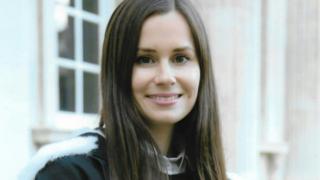 Image copyright AFP
Image copyright AFPA British-Australian woman serving a 10-year sentence in Iran for espionage has been transferred to a notorious prison in the desert, according to Iranian human rights activists.
Kylie Moore-Gilbert, a lecturer at Melbourne University, has been in jail since September 2018.
She strongly denies all the charges against her.
She spent almost two years sleeping on the floor in a cell in the capital Tehran, according to a friend.
She has been in solitary confinement and on several hunger strikes, and she is said to have been beaten for trying to comfort new prisoners by passing notes and writing to them on prison walls.
Now she has reportedly been moved to the notorious Qarchak prison.
The jail is sometimes used as punishment for Iranian political prisoners, reports Caroline Hawley, BBC World Affairs Correspondent. Conditions have been described by former inmates as abysmal.
Ms Moore-Gilbert, a lecturer in Middle East politics, has been able to make one phone call out. She told an Iranian human rights activist that she was in a very bad state, depressed and unable to eat.
In letters smuggled out of Tehran’s Evin prison in January, the lecturer said she had “never been a spy” and feared for her mental health. She said she had rejected an offer from Iran to become a spy.
The Cambridge-educated academic was travelling on an Australian passport and was detained at Tehran airport in 2018 as she tried to leave following a conference.
Click Here to Visit Orignal Source of Article https://www.bbc.co.uk/news/world-middle-east-53562435


